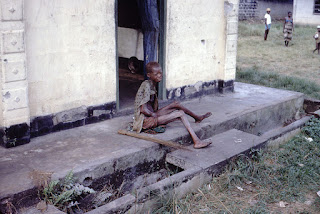La guerra civil en Nigeria, también conocida como la
guerra en Biafra, provocó la muerte de millones de personas, la mayoría de
hambre, y no terminó de consolidar una nación. Todavía se marcha pidiendo la
separación de Biafra y alguno que
otro activista prefiere el “Biafra o
muerte”. Ya ha habido suficiente muerte y se ha incluso lucrado con esto. ¿Por
qué no se busca otra solución? En vocabulario:
Stalemate, plight, y cause
célèbre
… images of
malnourished and starving Biafran children saturated the mass media of Western
countries. The plight of the starving Biafrans became a cause célèbre in
foreign countries, enabling a significant rise in the funding…
The Nigerian Civil War (also known as the
Biafran War) was a civil war in Nigeria
fought between the government of Nigeria
and the secessionist state of Biafra
from 6 July 1967 to 15 January 1970. Biafra
represented nationalist aspirations of the Igbo
people, whose leadership felt they could no longer coexist with the Northern-dominated federal government.
The conflict resulted from political, economic, ethnic, cultural and religious
tensions which preceded Britain's formal
decolonization of Nigeria from 1960
to 1963. Immediate causes of the war in 1966 included ethno-religious riots in Northern Nigeria, a military coup, a
counter-coup and persecution of Igbo
living in Northern Nigeria. Control
over the lucrative oil production in the Niger
Delta also played a vital strategic role.
 |
| Severely malnourished refugee being cared for in a refugee camp near the Nigerian-Biafran war zone |
Within a year,
the Federal Government troops surrounded Biafra,
capturing coastal oil facilities and the city of Port Harcourt. The blockade imposed during the ensuing stalemate led to mass starvation.
During the two and half years of the war, there were about 100,000 overall
military casualties, while between 500,000 and 3 million Biafran civilians died of starvation.
In mid-1968,
images of malnourished and starving Biafran
children saturated the mass media of Western
countries. The plight of the
starving Biafrans became a cause célèbre in foreign
countries, enabling a significant rise in the funding and prominence of
international non-governmental organizations (NGOs). The United Kingdom and the
Soviet Union were the main supporters of the Nigerian government, while France,
Israel and some other countries supported Biafra.
Para saber
Nigeria has been
home to a number of ancient and indigenous pre-colonial states and kingdoms
over the millennia. The modern state originated from British colonial rule beginning in the 19th century, and took its
present territorial shape with the merging of the Southern Nigeria Protectorate and Northern Nigeria Protectorate in 1914 by Lord Frederick Lugard.
The Igbo people are a meta-ethnicity native to the present-day south-central and
southeastern Nigeria and also Equatorial Guine. In rural Nigeria,
Igbo people work mostly as craftsmen,
farmers and traders. The most important crop is the yam. Other staple crops
include cassava and taro.
Before British colonial rule in the 20th
century, the Igbo were a politically
fragmented group. Since the defeat of the
Republic of Biafra in 1970, the Igbo are sometimes classed as a
"stateless nation".
The 1966 anti-Igbo pogrom was a series of
massacres committed against Igbo people
and other people of southern Nigerian
origin living in northern Nigeria
starting in May 1966 and reaching a peak after 29 September 1966. Between 8,000
and 30,000 Igbos and easterners have
been estimated to have been killed. A further 1 million Igbos fled the Northern
Region into the East. In response
to the killings some northerners were massacred in Port Harcourt and other eastern cities. These events led to the
secession of the eastern Nigerian
region and the declaration of the
Republic of Biafra, which ultimately led to the Nigeria-Biafra war.
Vocabulario
Stalemate: any position or situation in which no action can be
taken or progress made.
Talks between
union and management resulted in a stalemate.
Plight: a dangerous, difficult, or otherwise unfortunate
situation.
We must direct
our efforts towards relieving the plight
of children living in poverty.
A cause
célèbre /ˈkɔːz səˈlɛbrə/ is an issue or incident arousing widespread
controversy, outside campaigning, and heated public debate. While English speakers had used the phrase for
many years, it came into much more common usage after the 1894 conviction of Alfred Dreyfus
for espionage.
Nigeria's civil war explained - BBC News
… after more
than 50 years of the Biafran War some of the issues that set it off continue to
make headlines…
… in the south a
general declared the independence of the Igbo people but Nigeria would not
accept this…
… in the civil
war that followed it is estimated that more than a million people died, most of
them from hunger…
… the war might
have ended in 1970 but in Nigeria many people believe that many issues were not
resolved…
… a new
generation of pro-biafrans has re-ignited the cause and they hold marches
regularly…
Artículos
relacionados
No tengo nada para ofrecerles a excepción de sangre,
trabajo, lágrimas y sudor… Sangre,
sudor y lágrimas
Empezó en 1950 cuando Corea del Norte invadió Corea
del Sur, después de una serie de enfrentamientos a lo largo de la frontera… La
guerra de Corea
…le cortaban un dedo cada noche y lo arrojaban con
una flecha al campamento de los soldados con una nota diciendo que querían al
hijo del jefe… La
hija del general Patton
... las imágenes de niños de Biafra desnutridos y hambrientos saturaron los medios de comunicación... La guerra en Biafra
... las imágenes de niños de Biafra desnutridos y hambrientos saturaron los medios de comunicación... La guerra en Biafra
One of the
characters assisting Count Carl Gustav von Rosen was Lynn Garrison, an ex-RCAF
fighter pilot…
Esto es parte del archivo: ¡Biafra o muerte!
No comments:
Post a Comment